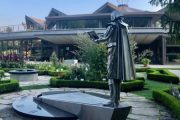This is story #9 in the series “Where Exactly is Home?”. The author recommends you read them in order.
Introduction:
“Where Exactly is Home?” follows the story of my parents, my two younger brothers and me, Susan, who emigrated from war-battered Britain, in the mid-late 1950’s, to Southern Rhodesia, Africa.
The effects of this move on our family were huge, as we struggled to adapt to such a different way of life. Only after further upheaval, and more long-distance travelling, did our family eventually settle in the city of Salisbury, Rhodesia.
However, we did not know then that we would not remain there for the rest of our lives, either.
When the family first went to Africa, I, Susan, was 9 years old. My two brothers, John and Peter, were almost 7 and 4, respectively.
Nowadays, as seniors, John and Peter live in England. I live in Canada. Throughout our lives, we have both benefitted from, and suffered because of, our somewhat unusual childhood.
I, for one, still sometimes ask myself which country represents home to me.
This is a series of stories under the title “Where Exactly is Home?” – I recommend you read them in order, starting with story #1.
9. A New Language and Lessons Learned
When I was a child of 10 or so, and my family of five had moved to Rhodesia, my brother and I, attending our local village school in Darwendale, were being bullied, by the Afrikaans-speaking students, most of whom were boarders. They had nothing better to do than yell at us in their language, knowing full well that we, as newly immigrated Brits, wouldn’t have a clue as to what they were saying. I must admit that body language and facial expressions gave us a strong hint that it often wasn’t nice, and that “Voetsek!” being snarled at us, meant that we had to get as far away as possible from the speaker.
When we told our parents how difficult our life was at school, my father taught us A-slang. He, who had spent years during WWII in India and Burma, claimed that A-slang had often been used in such places, to prevent the enemy from understanding what was being said by the Allied Forces. He told us it would take us no time to learn. We just had to practice.
So, it was, in fact.
Basically, A-slang, sometimes called Pig Latin, though I didn’t learn this till many decades later, is very easy, indeed. It is based upon the sounds in a word. Let me explain, giving a few examples.
Take a word, like “dog”; remove the letters up to the first vowel sound, in this case the letter D, making the sound “d”; add it to the end of the word, followed by the sound of the capital letter “A”(-ay). Thus “dog” becomes “og-d+ay”; “cat” becomes “at-c+ay”, and “there” becomes “ere-thay”. Words which begin with a vowel, simply add the “ay” sound onto the end. “On”, “at”, “in” become “on-ay”, “at-ay”, and “in-ay”. Long words with many syllables are broken up as if each syllable were a word, so “refrigerator”, for example, would land up as “e-r-ay, ige-fr-ay, ator-ay”, somewhat of a tongue-twister.
John and I became proficient in our new language. Sometimes, we would just keep reciting nursery rhymes over and again, as fast as we could, but it didn’t matter, because all that mattered was that no-one else understood what we were saying.
What was truly amazing to us, was how surprised, puzzled and frustrated the other children became. Still John and I continued, not talking to anyone else, except to each other. The most incredible thing of all, was that the other students soon stopped using their streams of Afrikaans abuse. Instead, speaking English, which language they all knew perfectly well, too, they wanted to know which language we were speaking. Of course, we wouldn’t tell them. Luckily, the novelty soon wore off. English, which was always used in the classroom, in any case, became the language used by all, even in the playground.
Today, many decades later, I can still recite, fast, in perfect A-slang, nursery rhymes I used to chant in that playground, when I was a child of ten. My favourite for its effectiveness in stopping all conversation around me, was, and still is:
“Georgie Porgie Puddin’ and Pie,
Kissed the girls and made them cry,
When the girls came out to play,
Georgie Porgie ran away.
Perhaps, you would like to try it yourself? I will start you off with the first line:
Orgie-j-ay, orgie-p-ay, uddin’-p-ay, and-ay, ie-pay,
Issed-k-ay…….
Can you carry on? Yes? No?
Well, John and I could, and, now in our seventies, we still can!
A-slang may have helped the Allied Forces during the War, but it also helped my brother and me cope with our new life in the African bush.





